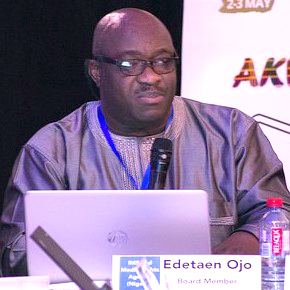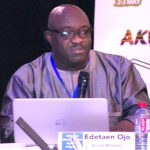Media Rights Agenda (MRA) has expressed concern over the growing number and frequency of attacks against journalists in Nigeria and called on media organizations and outlets to collaborate with it to address the problem and combat impunity for crimes against journalists.
MRA’s Executive Director, Mr. Edetaen Ojo, made the call when he led a delegation from the organization on an advocacy visit to the management of TVC Communications, a privately owned broadcast company, at its headquarters in Lagos.
In attendance at the meeting were TVC’s Director of News, Mrs. Stella Din-Jacob; its Executive Director, News, Mr. Uzonna Ononye; and Assignment Editor, Mr. Asuquo James, while Mr. Ojo was accompanied by Mr. Segun Fatuase, MRA’s Director of Projects; Ms. Chioma Nwaodike, the Head of its Legal Unit; and Ms. Obioma Okonkwo, Legal Officer.
Mr. Ojo explained that the objective of the visit was to brief the TVC management about MRA’s project focusing on the safety of journalists and other media workers and to solicit the support and collaboration of TVC in its implementation to ensure that journalists and other workers in the broadcast outfit are able to benefit from the services offered by MRA under the project while also creating awareness about it for the benefit of the entire media community in Nigeria.
He said MRA is providing pro bono legal and litigation assistance to journalists in Nigeria whose rights are threatened or violated in the course of carrying out their professional duties or because of their work.
According to Mr. Ojo, incidence of attacks on journalists has grown dramatically since the late Editor-in-Chief of Newswatch magazine, Mr. Dele Giwa, was killed on October 19, 1986 through a parcel bomb delivered to him at his breakfast table on that day by still unknown persons.
Saying that it is ironic that attacks on journalists, including killings, are actually worse now than during the military era and that journalists are more endangered now than they ever were in Nigeria’s history, he noted that from October 19, 1986 when Mr. Giwa was killed until May 29, 1999, when democratic rule was restored in Nigeria, seven journalists were killed in the country over this period of less than 14 years, which is often regarded as among the darkest in Nigeria’s history as it was a time of military rule in which the environment was very hostile to human rights, including media freedom.
However, Mr. Ojo said, in the approximately 22 years from May 29, 1999 to date, when Nigeria has supposedly been under civil democratic rule, MRA has recorded at least 17 journalists killed either in the line of duty or as a result of their work.
He observed that in all of these cases, there is no single instance when an effective investigation has been conducted and the perpetrators have been arrested, prosecuted, jailed or punished in any other way for their crime, meaning that in all the cases, the perpetrators assassinated the journalists with impunity as they went completely free.
Mr. Ojo argued that such an atmosphere obviously sends a wrong message to the perpetrators that they can kill journalists and that there will be no adverse consequences for them, adding that during the same period since 1986, there have been hundreds of other crimes committed against journalists and other media workers in the country, including kidnappings and abductions, involuntary or enforced disappearances; torture, degrading or inhuman treatment; arbitrary arrests and detention; assault and battery as well as other forms of physical violence; arbitrary raiding and searching of homes and offices; as well as other forms of intimidation, threats and harassment, including targeting their family members.
He said: “What this means is that attacks on the media, particularly the killing of journalists, have escalated during the period of civilian democracy, far above the levels recorded during the period of military regime. In virtually all cases, dating back to 1986 and earlier, law enforcement and security agencies have never conducted any serious investigation into any of these incidents or held anyone accountable for these crimes against journalists despite the obligation that the Government has to protect all citizens, including media professionals.
Mr. Ojo pointed that in many of the recorded cases of attacks against journalists, law enforcement and security agencies as well as other government institutions and officials have been the perpetrators of the attacks.
He said it was in the light of such an unsavoury situation that MRA decided to undertake the project to ensure the safety of journalists and other media workers and combat impunity for attacks and crimes against journalists.
Mr. Ojo explained that the project, which is supported by the Global Media Defence Fund (GMDF) and the United Nations Educational, Scientific and Cultural Organization (UNESCO), is aimed at providing pro bono legal assistance and litigation support to journalists whose rights are threatened or violated to protect their rights and combat the culture of impunity for such attacks, while also seeking to provide a safe environment for them to effectively carry out their work.
He said MRA is also relying on the support of a network of seasoned lawyers from across Nigeria who are lending the benefit of their knowledge, legal expertise and experience to the project free of charge in the defence of journalists and media organizations when their rights are violated or threatened or where their safety or security is in jeopardy.
Mr. Ojo stressed that where appropriate legal mechanisms or instruments are either not available at the national level or are ineffective, MRA will take advantage of available mechanisms and instruments at regional and international levels as well as the protections and remedies that they offer.
He said: “In every case undertaken on behalf of media victims of attacks, MRA will seek to bring the full weight of relevant national, regional and international instruments and mechanisms to bear on the perpetrators, regardless of whether they are government officials, law enforcement and security agents, or non-state actors.”
According to Mr. Ojo, “We are basically trying to use the law to challenge attacks against journalists based on the principle that government has a responsibility to protect journalists, as part of its basic obligations in a number of national and regional treaties to which Nigeria is a signatory,” adding that “We are leveraging these instruments and a number of domestic laws like the Police Act which gives the police the responsibility to investigate and prosecute offenders of crimes, the Anti-Torture Act, the Violence Against Persons, and so on. We are trying to use the law progressively to challenge these cases and compel government to perform its duty. That’s essentially what this is about.”
Pointing out that TVC had clearly been a victim of attacks as well as impunity for such attack, he said: “The kind of attack that TVC suffered last year during the #ENDSARS protests is a good example. As far as we know, there has been no investigation or arrest of anybody involved in that attack. That is not right. We have law enforcement agents who should be able to apprehend some of the perpetrators but over time we have come to accept that it is normal for people to do this sort of thing and just walk away. And government is not rising to the occasion.”
Mr. Ojo stressed that MRA has also decided that even when journalists do not want to go to court for any reason, the organization would find a way to nonetheless make the attackers accountable, adding that where the law permits MRA as a human rights organisation, to take action on behalf of any victim of attack, even without the victims standing up to vindicate their rights, MRA would nevertheless go to court and try to get justice for the journalist.
He explained that MRA has decided on this strategy and approach because if attacks against journalists remain unchallenged and nothing is done, the situation would only encourage more attacks as impunity takes hold.
Mr. Ojo asked TVC to support MRA to create awareness within the media community about the existence of the initiative so that all deserving journalists and other media workers can benefit from it and contribute towards ensuring a more conducive environment for media practice and the practice of journalism in Nigeria.
He said: “It is also imperative that the attention of various governments, particularly at the Federal and State levels, is constantly drawn to the responsibility that they bear to protect journalists and the media in general to make the atmosphere conducive for media practice so that media professionals can continue to perform their constitutional duties of, among other things, upholding the responsibility and accountability of the Government to the people.”
Responding, Mrs. Din-Jacob commended the initiative of MRA and expressed the willingness of her organisation to support the project. She also appealed to MRA to assist in train TVC staff in the evolving trends in the media world as well as on ethics and professional standards.
She said: “We would definitely want to work with you and we would definitely crave your indulgence to see how we can get you as our trainers in many areas of media development. Another thing we can do together is to organise seminars and conferences where we invite MRA to talk about the role of the media to show that responsibility is a trust, which means we must make sure we mean what we say.”
Mrs. Din-Jacob stressed that journalists must be ethical and professional in accordance with the norms and standards of the profession in order for them and the media in general to earn public trust.
She said: “As journalists, we hold in our hands public trust and we have the ability to express what we think is right and what we think is wrong. But how do we help this democracy that is still in its infancy? Journalists in Nigeria need to be taught what is politically correct while reporting certain things. There is no need for colouration. Journalists need to be cautious. Let us not demonise people in the course of reporting.”







